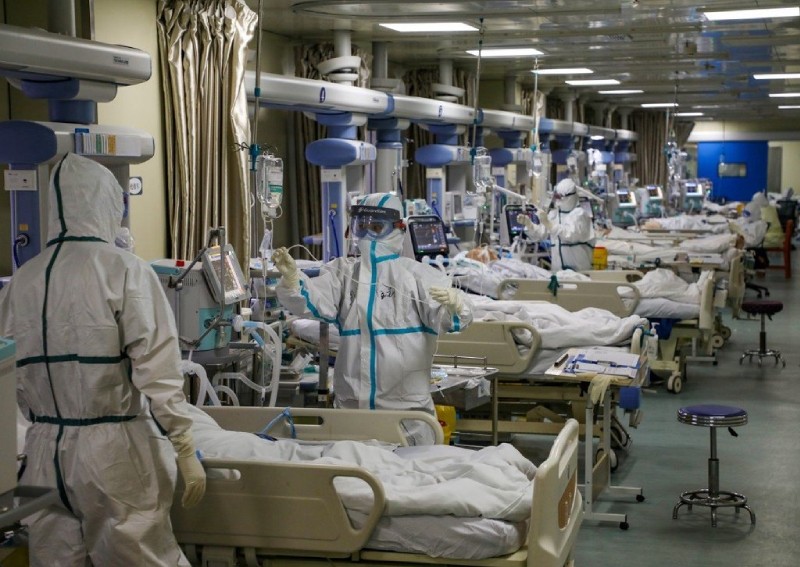12 months on, many patients in Wuhan find their Covid-19 symptoms still persist

Reuters
Nearly half of about 1,200 recovered Covid-19 patients in Wuhan still had symptoms a year after they fell ill, according to a new study that highlights the need for long-term support.
Chinese researchers from hospitals in Beijing and Wuhan focused on patients from the city in Hubei province where the first cases of the disease were reported in late 2019.
After 12 months, 20 per cent of the patients were still experiencing the most common symptoms of fatigue or muscle weakness, according to the peer-reviewed study published in The Lancet medical journal on Thursday. It found 17 per cent had difficulty sleeping and 11 per cent suffered hair loss.
“While most had made a good recovery, health problems persisted in some patients, especially those who had been critically ill during their hospital stay,” said co-author Cao Bin, from the National Centre for Respiratory Medicine at the China-Japan Friendship Hospital in Beijing.
The study followed more than 1,200 people who were discharged from a Wuhan hospital between January and May 2020. Photo: APThe study followed more than 1,200 people who were discharged from a Wuhan hospital between January and May 2020. Photo: AP
The study followed more than 1,200 people who were discharged from a Wuhan hospital between January and May 2020. Photo: AP
Nearly half of about 1,200 recovered Covid-19 patients in Wuhan still had symptoms a year after they fell ill, according to a new study that highlights the need for long-term support.
Chinese researchers from hospitals in Beijing and Wuhan focused on patients from the city in Hubei province where the first cases of the disease were reported in late 2019.
After 12 months, 20 per cent of the patients were still experiencing the most common symptoms of fatigue or muscle weakness, according to the peer-reviewed study published in The Lancet medical journal on Thursday. It found 17 per cent had difficulty sleeping and 11 per cent suffered hair loss.
“While most had made a good recovery, health problems persisted in some patients, especially those who had been critically ill during their hospital stay,” said co-author Cao Bin, from the National Centre for Respiratory Medicine at the China-Japan Friendship Hospital in Beijing.
“Our findings suggest that recovery for some patients will take longer than one year, and this should be taken into account when planning delivery of health care services post-pandemic.”
The authors said theirs was the largest tracking survey to date of recovered Covid-19 patients who had been hospitalised. They followed 1,276 former patients after they were discharged between January and May 2020 from the Wuhan Jinyintan Hospital, which treated some of the earliest Covid-19 patients. The city was the initial epicentre of the outbreak and had reported more than 50,000 cases by the time a strict, months-long lockdown of the city’s 11 million people was lifted on April 8, 2020.
For the study, the patients – who had an average age of 59 – went through health checks, lab tests and six-minute walking tests to assess their endurance at six and 12 months after they first experienced Covid-19 symptoms.
At the one-year mark, fewer survivors reported health problems compared to the same survey at six months. And 88 per cent of those who were working before they got infected had returned to their jobs after a year. But overall, those in the study remained less healthy than Wuhan residents who did not get Covid-19, according to the researchers.
They said three in 10 survivors still experienced shortness of breath a year later, while slightly more had anxiety or depression compared with the earlier survey. But they found that 4 per cent of patients were suffering from a smell disorder a year later, compared with 11 per cent at the half-year mark.
After a year, difficulty passing oxygen into the blood in the lungs’ air sacs was experienced in 20 to 30 per cent of the survivors who were moderately ill, but that rose to 54 per cent for those who were put on ventilators during their hospital stay.
The authors called for larger studies to understand the long-term consequences of the disease and for more support for survivors.
“We do not yet fully understand why psychiatric symptoms [like anxiety and depression] are slightly more common at one year than at six months in Covid-19 survivors,” wrote another co-author, Gu Xiaoying, from the Beijing hospital’s Institute of Clinical Medical Sciences.
“These could be caused by a biological process linked to the virus infection itself, or the body’s immune response to it. Or they could be linked to reduced social contact, loneliness, incomplete recovery of physical health or loss of employment associated with illness.”
In an accompanying editorial, The Lancet described long Covid as “a modern medical challenge of the first order”.
“With no proven treatments or even rehabilitation guidance, long Covid affects people’s ability to resume normal life and their capacity to work. The effect on society, from the increased health care burden and economic and productivity losses, is substantial,” the editorial said.
“Poor recognition of long Covid and lack of clear referral pathways have been common problems worldwide,” it said, noting that only 0.4 per cent of patients in Wuhan had taken part in a professional rehabilitation programme.
More than 213 million people have been infected with the coronavirus since the pandemic began, according to the World Health Organisation.
The UN health agency in February released a post-illness report form to be used by medical professionals worldwide so that long Covid data can be collected in a standardised way.
“This will help to improve the understanding, surveillance and clinical management of the condition,” WHO director general Tedros Adhanom Ghebreyesus said at the time. “Given the scale of the pandemic, we expect many people to be affected by post-Covid-19 condition.”
In Hong Kong, 80 per cent of recovered Covid-19 patients continue to experience at least one symptom six months after infection and nearly a third have reported suffering from more than three, Chinese University researchers said in January.












Leave a Reply